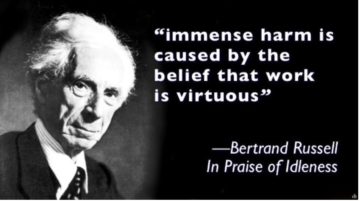by Emrys Westacott
 The work ethic is deeply ingrained in much of modern society, both Eastern and Western, and there are many forces making sure that this remains the case. Parents, teachers, coaches, politicians, employers, and many other shapers of souls or makers of opinion constantly repeat the idea that hard work is the key to success–in any particular endeavour, or in life itself. It would be a brave graduation speaker who seriously urged their young listeners to embrace idleness. (I did once hear Ariana Huffington advise Smith College graduates to “sleep their way to the top,” but she essentially meant that they should avoid burn out by ensuring that they get sufficient rest.)
The work ethic is deeply ingrained in much of modern society, both Eastern and Western, and there are many forces making sure that this remains the case. Parents, teachers, coaches, politicians, employers, and many other shapers of souls or makers of opinion constantly repeat the idea that hard work is the key to success–in any particular endeavour, or in life itself. It would be a brave graduation speaker who seriously urged their young listeners to embrace idleness. (I did once hear Ariana Huffington advise Smith College graduates to “sleep their way to the top,” but she essentially meant that they should avoid burn out by ensuring that they get sufficient rest.)
There are, to be sure, some distinguished critics of the work ethic. In a 1932 essay, “In Praise of Idleness,” Bertrand Russell wrote that “immense harm is caused by the belief that work is virtuous.” In his view, “the morality of work is the morality of slaves, and the modern world has no need of slavery.”
But Russell doesn’t really praise idleness as that word is normally understood. True, what he advocates is less work and more free time so that people can spend most of their days doing as they please. But he clearly thinks that some ways of spending one’s time are better than others. He hopes, for instance, that, better education will reduce the chances that a person’s leisure time will be “spent in pure frivolity.” He prefers active recreation, like dancing, to passive recreation, like watching sport. And he strongly prefers cerebral to manual activity. He writes, for instance, that
moving matter about, while a certain amount of it is necessary, is emphatically not one of the ends of human life. If it were we would have to consider every navvy superior to Shakespeare.
(For a brilliant logician, this is an extraordinarily bad piece of reasoning. An activity could be one of the possible ends of human life without being the only end or the “highest” end. Equally remarkable, though, is the intellectual snobbery the statement betrays, suggesting as it does that writing a play is self-evidently a “superior” goal to any kind of skilled feat of craftsmanship or engineering.) Read more »
